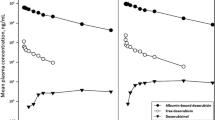Abstract
Purpose: 7-Hydroxystaurosporine (UCN-01) is a potent protein kinase inhibitor and is being developed as a novel anticancer agent. We describe here its pharmacokinetics and pharmacodynamics in experimental animals. Methods: The pharmacokinetics of UCN-01 were studied following intravenous (i.v.) administration to mice, rats and dogs at doses of 1–9, 0.35–3.5 and 0.5 mg/kg, respectively. We also studied the pharmacodynamics of UCN-01 (9 mg/kg per day) during and after five consecutive i.v. administrations to nude mice bearing xenografted human pancreatic tumor cells (PSN-1). The concentrations of UCN-01 in plasma and tumor were measured by HPLC using a fluorescence detector. Results: UCN-01 in plasma after i.v. administration was eliminated biphasically in mice and rats, and triphasically in dogs. The elimination half-lives in mice, rats and dogs were 3.00–3.98, 4.02–4.46 and 11.6 h, respectively. The total clearance (Cltotal) values in mice, rats and dogs were high (1.93–2.64, 2.82–3.86 and 0.616 l/h per kg, respectively). The hepatic clearance (Clhepatic) in rats represented 54.0–81.3% of Cltotal. The volumes of distribution at steady-state in mice, rats and dogs were large (7.89–8.42, 13.0–16.9 and 6.09 l/kg, respectively). These pharmacokinetic parameters were dose-independent in mice and rats. UCN-01 produced significant inhibition of tumor growth during five consecutive i.v. administrations in mice bearing the xenografted PSN-1 cells, and the inhibitory effect continued for 3 days after the final administration. UCN-01 concentrations in tumor tissue were much higher than those in the plasma, and the ratio of tumor to plasma concentrations was about 500 at 24 h after five consecutive doses. Conclusions: The pharmacokinetic studies showed that UCN-01 has a high clearance and large distribution volume in various experimental animals, and its disposition is linear over the range of doses tested. The pharmacodynamic study showed that UCN-01 is distributed at much higher concentrations in tumor than those in plasma and that it significantly inhibits tumor growth. The high distribution of UCN-01 into tumor cells may contribute to the potent inhibition of tumor growth in vivo.
Similar content being viewed by others
Author information
Authors and Affiliations
Additional information
Received: 29 April 1998 / Accepted: 28 October 1998
Rights and permissions
About this article
Cite this article
Kurata, N., Kuwabara, T., Tanii, H. et al. Pharmacokinetics and pharmacodynamics of a novel protein kinase inhibitor, UCN-01. Cancer Chemother Pharmacol 44, 12–18 (1999). https://doi.org/10.1007/s002800050939
Issue Date:
DOI: https://doi.org/10.1007/s002800050939




